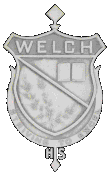Bluefield Daily Telegraph, Bluefield, WV
May 27, 2012
Historic McDowell County coal baron home is B&B, ATV lodge
BILL ARCHER
Bluefield Daily Telegraph
SWITCHBACK — Of all the mansions that were built in the early 20th Century by the wealthy coal barons who made their fortunes from southern West Virginia and southwestern Virginia’s rich coal deposits, none can compare to the mansion on Power House Hill in Switchback that was built by James Ellwood Jones.
Jones, who died at age 58 of a heart attack on Nov. 25, 1932, was the most powerful of the region’s coal barons and the only one who spent most of his life, living and working in the coalfields. He was the son of Mercer and McDowell county coalfield pioneer, Jenkin Jones, the McDowell County coal pioneer who had the town, Jenkinjones, named in his honor. The younger Jones was educated at Roanoke College and Columbia University, where he earned a degree as a mining engineer. He invented many machines used in coal mining including the Jones Coloader, a predecessor of the modern continuous mining machine.
As vice president and general manager of the Pocahontas Fuel Company, he was among West Virginia’s wealthiest men. While the home he built on Power House Hill is spectacular, his philanthropy was even more impressive. During his life time, he paid for a college education for hundreds or perhaps thousands of young people from the coalfields, who received the money with the singular requirement of never disclosing the identity of their benefactor. He established and provided financial support for dental and tonsil clinics in McDowell County, built the gym/swimming pool building at Elkhorn High School in Switchback and spent 25 years on the county commission working to bring good roads to the county.
The palatial home he shared with his wife, Edith, and their children, Nancy and Jimmy, was spacious like many mansions in the coalfields, but had the singular feature of 66 stained glass windows that had been imported from Scotland that formed a semicircle around the grand room of the home. Jones was near the fireplace in that room playing cards with his physician, Dr. I.C. Peters, when he suffered his fatal heart attack.
After his death, the coal industry took a dramatic change. Fewer coal operators lived near the mines they operated. In 1933, President Franklin D. Roosevelt put federal law behind the rights of coal miners to organize as part of the far-reaching New Deal legislation and almost overnight, the coal miners in the region joined the United Mine Workers of America. The mansion had some use, but was eventually abandoned and ultimately sold at a sheriff’s sale in the early 1950s for $15,000.
“When daddy bought it, my mother had no control in the way it was decorated,” Judy McDaniel said of the Jones Mansion on Power House Hill. Her father, Dale Henderson, owned the old Henderson Market in Maybeury, and her mother Grace Henderson (later Haynes) took care of the house. “She went along with what daddy said,” McDaniel said.
“When I lived here, I swept the whole house,” McDaniels said. “It was like a person.”
After McDaniel’s father died, Grace, kept the mansion and lived there with her husband Paul Haynes. Grace Haynes knew the history of the home, and was always eager to share the story of James Ellwood Jones. It was Grace who saw that the house was going to be sold at a sheriff’s sale and went with her husband to make the winning bid.
After Grace passed away, her son, David Henderson and his wife, Jennette, moved into the residence. After her father died, Jennette Henderson brought her mother, Martha E. Barber to live with them. On Feb. 14, 1998, the State Police made the gruesome discovery that David Henderson, his wife Jennette and her mother had all been shot and killed. Within days, the state police had arrested Stanford Tony Allen of Barlow Hollow for the murders. Allen was convicted of the crimes in the fall of 1999, and was sentenced to life in prison.
In the late fall of 1998, before the trial, McDaniel was distraught over the loss of her brother, and decided to sell the home and most of its furnishings. The auction drew a few hundred people to Power House Hill and the bidding was robust. Billy Cherry, then chairman of the board of the First National Bank of Keystone bought the house for $160,000. A year earlier in early November 1997, Cherry had made new signature cards for the four passbook savings accounts held by her late boss, J. Knox McConnell, who died on Oct. 26, 1997, and claimed that she and McConnell jointly held in excess of $4.2 million.
Cherry built a deck around the pool Jones had built on the grounds and tried to open it as a bed & breakfast called the “Blair House” in memory of Cherry’s late mother. However, the Office of the Comptroller of the Currency declared the bank insolvent due to apparent fraud and closed it on Sept. 1, 1999, and appointed t

